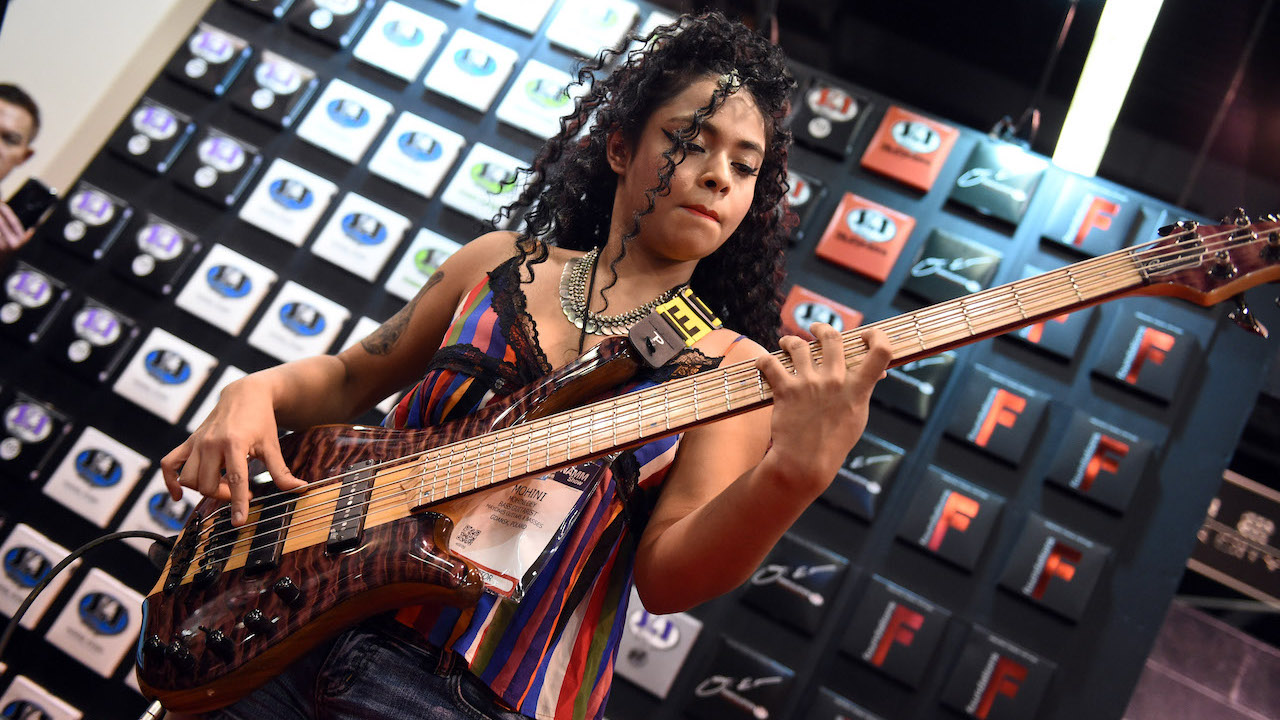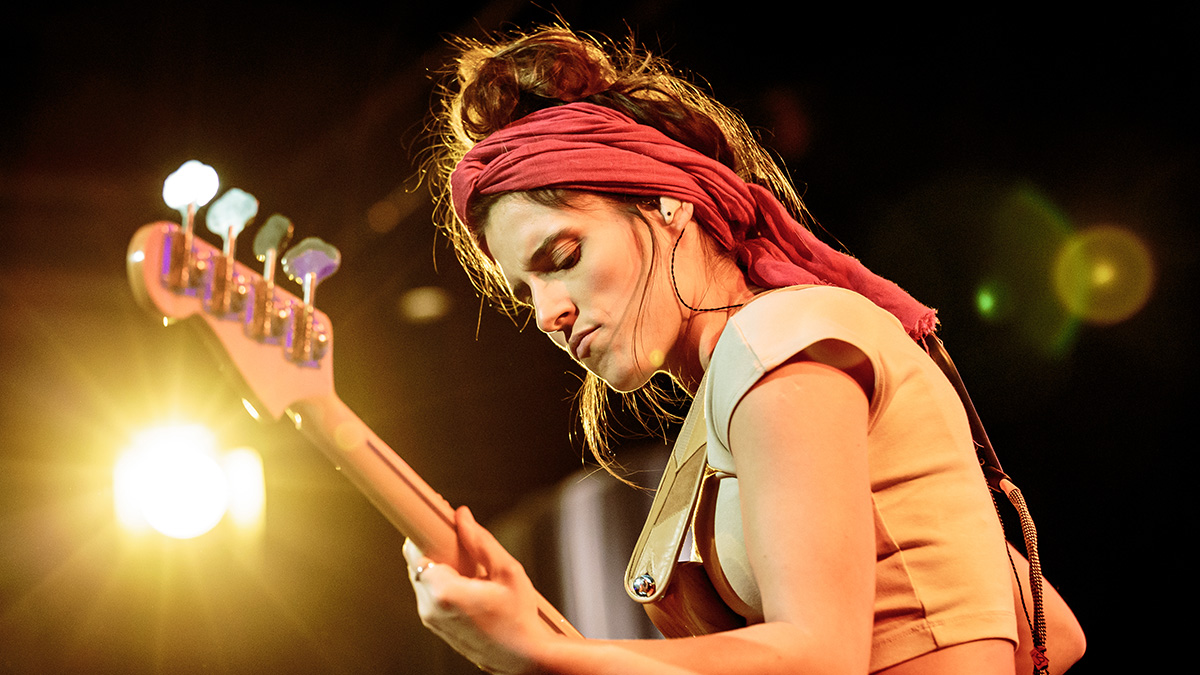“On four-strings you have to jump to get the second octave, but on the five-string it’s right there”: Mohini Dey reflects on her switch to five-string basses – and the advice her dad gave her about Jaco
Mohini Dey has achieved more with the bass guitar than most of us achieve in a lifetime. And she’s only just getting started

All the latest guitar news, interviews, lessons, reviews, deals and more, direct to your inbox!
You are now subscribed
Your newsletter sign-up was successful
A genuinely astounding bassist, Mohini Dey has enjoyed a rapid ascent to worldwide renown in recent years. As a kid she performed alongside a fearsome range of talent in her home town of Mumbai, including the composers A.R. Rahman and Nitin Sawhney, before coming to the attention of another stellar cast of players in the West.
Musicians such as Guthrie Govan, Dave Weckl, Jordan Rudess, Steve Vai, Mike Stern, George Brooks and Narada Michael Walden have shared a stage or studio with Dey, and no modern NAMM Show is complete without her.
Look into Dey’s setup and you’ll see one constant: a five-string Mayones bass. Has she ever tried a six-string bass guitar, we ask?
“I started playing with four strings, but after two years I switched to five because I had more room to improvise and more room to move around. On four-strings you have to jump to get the second octave, but on the five-string it's right there, which is fun. I tried a six-string, but I have really small fingers and it's really hard to move on the fretboard, which is really broad.”

We sat down with Dey to chat about the music scene in Mumbai, her love of Markbass, and the one bass player she admires.
What are your current projects?
“Right now I'm recording for a lot of artists from my home studio in India. I don't have to travel much, but I get to work from my own home studio, which is a good thing. I also play with a drummer and a guitar player in my own band.”
All the latest guitar news, interviews, lessons, reviews, deals and more, direct to your inbox!
Do you have a manager, or do people come to you directly?
“I started working professionally when I was nine years old and I'm 28 now, and I managed myself for all those years. More recently my husband has been managing me, which is really helping me a lot, because I'm dealing with so much stuff. I just want to work on music and not deal with invoices and talk to organisers. It is just too much to deal with.”
It sounds like you're incredibly busy.
“I’m really thankful for that. I'm very blessed and I'm really happy that people want me for what I am, and they don't want to change me in any way. They want my voice on their songs, which is really great, but since I am only working with other people, sometimes it restricts me from doing my own work.”

“I want to do my own album and write my own songs, which I do on the side, so I wish I could take some time off from working with other people and do my stuff, but since I'm in demand right now and I don't want to lose it. I want to make lots of money and invest that in my new album.”
How did you get started on bass?
“I started learning bass from my dad when I was three. At the time my dad was playing with a lot of classical musicians in Mumbai. He was practising at home, just like any other day, and he put the headphones on my ears. I loved what he was playing on the headphones and I started tapping the tempo on my lap.
“Seeing that, my dad encouraged me to learn the bass, but he always told me that there was no pressure. He said, ‘If you want to do it, you do it. Otherwise, you choose what you want to do.’ I always wanted to become a fashion designer, so I applied to a fashion college and I got selected. By then I was already playing with a lot of musicians, so I had to choose between music and fashion.”
Was that a difficult decision?
“Not really. Fashion is something I can always do on the side, but music is something that I have spent so much time with. I couldn't let that go to waste. I then started playing with A.R. Rahman. I got really into it and started writing my own music, and I guess it just all happened and fell into the right place. I didn't really choose it. It just kind of happened naturally.”
Who were the bass players that you admired when you were learning?
“The first bass player that my dad introduced me to was Jaco Pastorius, at the age of seven or eight. He would want me to learn all the songs and understand why Jaco applied different playing styles. I started learning all this, and my dad got me learning to read and write music. He told me, ‘You have to do this, because it's very important if you want to play on an international level.’ I used to hate to read and write, but I trained myself to have fun with it.”
What's the music scene like in Mumbai?
“Mumbai is the biggest city when it comes to music. There's a saying there: if you can survive in Mumbai, you can survive anywhere, because there is a lot of competition. I actually moved to Bangalore, but that's only because my husband lives there. I'm always on the road, so it's hard to meet each other and spend time, so I thought it would be a good thing to move. I can work from anywhere. My parents live in Mumbai. but they're fine. I've been taking care of my own house and my parents' house since I was 18 years old, so it's not a big deal.”
Is your career working out the way that you hoped it would?
“Yes. I never had an demands or wants in my life. Everything just happened to me, maybe because I was just doing music and I didn't expect anything. It's best when you don't expect anything, because you can keep challenging and working harder and giving people what they want, when you're working for them.”

“Every time I work with people, I keep that in mind. You should always serve the music and not just yourself. I guess that's why people like working with me. I'm really straightforward as a person and I don't have many demands. I just ask what they want and I give them what they want. I talk to them like I'm talking to you now. It's the same. I think that's best.”
Run us through your current gear.
“I play Mayones basses. I've been with them for the past few years. I also endorse Markbass amps. You know how amazing Markbass is. And I endorse Gruv Gear, who have sent me a lot of cases and fret wraps, and Providence cables, TC Electronic pedals, Boss pedals and SIT strings. I play Rock Brights .45 to .125 because I like the high end. Most bass players playing in metal bands love that, and I love that too, even though I don't play in a metal band.”
Joel McIver was the Editor of Bass Player magazine from 2018 to 2022, having spent six years before that editing Bass Guitar magazine. A journalist with 25 years' experience in the music field, he's also the author of 35 books, a couple of bestsellers among them. He regularly appears on podcasts, radio and TV.


